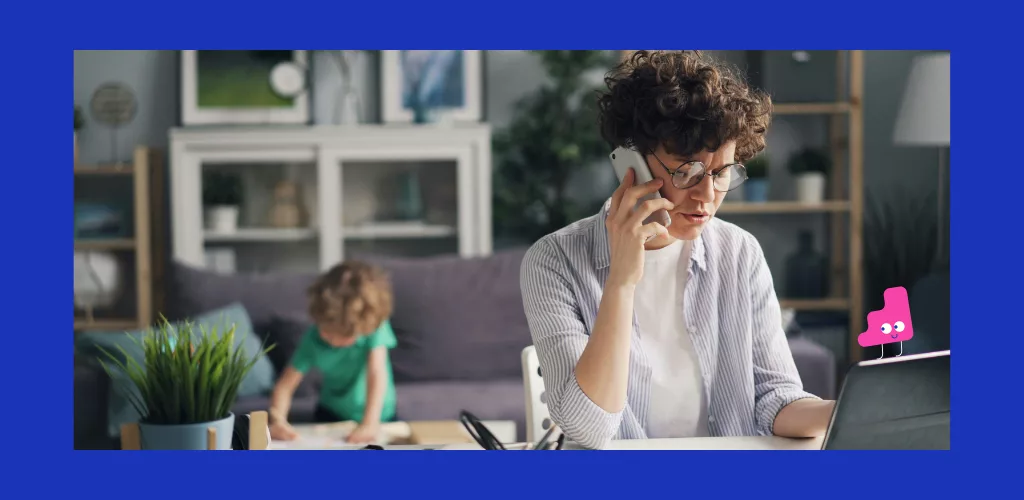One working parent in two says they're exhausted on a Friday evening. 77% of parents say they don't have enough time for their personal life. These figures, taken from the latest surveys on parenthood, reveal a reality you may be familiar with: that feeling of constantly being on the run, juggling a thousand priorities, without ever feeling like you're really getting anywhere.
What if the problem lies not in our organization, but in the illusion that we can have it all, achieve it all, all at the same time?
The marketing illusion of parental perfection
The "all at once" myth
We've been sold a dream: that of the super-parent who excels at work, raises happy children, maintains a perfect home and still finds time for his or her passions. This pressure to "succeed at everything" has insidiously crept into our minds, creating a veritable spiral of exhaustion.
This race for perfection generates two major problems for parents:
-
The "always more, always better" syndrome
-
Permanent guilt that interferes with every moment of life
The reality is that this quest for perfect balance leads us straight to overwhelm. We always feel like we're behind on something, completely in fear of missing out, which prevents us from concentrating on what's essential.
When balance becomes a trap
The term "work-life balance" itself is problematic. It suggests a fixed, perfect notion, where everything is measured out to the gram. But the reality of parenthood is constant movement, constantly adapting to the changing needs of our children and the vagaries of life.
Rather than looking for an impossible balance, it's better to talk about harmony. Balance is static, a standstill. Life, on the other hand, is perpetual motion, a fast-moving video that demands constant adaptation.
Figures that reveal our collective exhaustion
Parents under constant pressure
The statistics speak for themselves and reveal the scale of the problem:
-
72% of women feel that parenthood has had a negative impact on their career
-
15% of working parents are experiencing burn-out, according to the Observatoire de la parentalité au travail (Observatory on parenthood at work)
-
29% of employees who are parents avoid talking about their family commitments at work for fear of being judged
-
60% of executives check their work e-mail in the evening or at weekends
These data reveal a system that pushes parents to the point of exhaustion, between professional injunctions and family responsibilities.
Guilt, the invisible scourge
Guilt manifests itself in all the interstices of life. When we're at home, we think we should be at work. When we're at work, we think about the kids and the activities we're missing.
This permanent guilt exhausts us mentally and prevents us from taking full advantage of the present moments, whether professional or family. It doesn't drive us to make positive choices and generates a lot of rumination, which is not good for our mental health.
Rethinking our approach: from perfectionism to authenticity
Accepting movement rather than seeking balance
Instead of aiming for a perfect, fixed balance, experts recommend embracing the concept of movement. You can have it all over time, but you have to choose by phase, by stage. These choices, be they career or investment in parenthood, can be made again and again, and are not set in stone.
This approach makes it possible to :
-
Give yourself the right to prioritize differently at different times of life
-
Accept that certain phases are more intense professionally
-
Recognize that other times require more family investment
The importance of conscious choices
Faced with this complexity, one question becomes central: what is important and what is essential? This reflection on the important versus the essential becomes a powerful tool for :
-
Making decisions in line with our values
-
Avoid getting bogged down in secondary tasks
-
Rediscovering meaning in our daily choices
Practical strategies for overcoming parental burnout
Distinguishing between useful and sterile guilt
Not all guilt is created equal. There is a "useful guilt" that awakens us to our values and tells us when we are not aligned with our choices. This kind of guilt is a signal that enables us to put things right.
Then there's "sterile guilt", that inner critic who keeps telling us that "it's never enough, it's never good enough". It's just toxic self-talk, a little mental tyrant that generates a lot of stress without providing any solutions.
Learning to recognize this sterile guilt and putting it aside frees up considerable energy. It is often no more than a reflection of patriarchal injunctions that tell us we should be everywhere at once.
Return to the present to calm the mind
When faced with the whirlwind of thoughts between work and family, a simple but effective technique: return to the body and the breath. When guilt or feelings of overwhelm rise, the first thing to do is to return to the present, before even trying to mentalize anything.
In concrete terms :
-
Breathing deeply when guilt rises
-
Focus on physical sensations
-
Observe your hand and its lines to anchor your attention in the present moment.
-
Remember: "I am here and now".
Deconstructing our mental models
Many parents of the 80s and 90s felt the need to be both father and mother. On the one hand, the parent who was a company director or an executive, who got up at 6.30am and came home at 8pm. On the other, the parent who runs a perfect home, keeps everything tidy and looks after the children.
This awareness allows :
-
Identify the injunctions inherited from our upbringing
-
Consciously choosing which models we want to perpetuate or transform
-
Creating our own definition of successful parenting
Sometimes you have to learn to give up, to have a messy house, to accept that not everything is perfect. It's either that or burn-out.
The model we pass on to our children
What kind of example are we setting?
A fundamental question arises: what kind of role model do we want our children to be? What will we pass on to them if our children see us everywhere all the time, wanting to be everything and for everything to be perfect?
Our children learn as much from our behavior as from our words. An exhausted parent running around tells them that it's normal to be overwhelmed, that this is what adult life is all about.
The importance of "nothing" times
When we think about our children's needs, we realize that it's important for them not to be busy all the time. They need periods of time where they can be bored, rest, or create things out of nothing.
Reflecting on our children's needs sheds light on our own. If we want them to learn serenity, we have to cultivate it ourselves. In fact, we all need the same things we want for them.
Towards more serene parenthood
Redefining our priorities
Instead of trying to master everything, let's focus on the essentials:
-
Identifying what is truly non-negotiable for us
-
Accept that some things are imperfect
-
Delegate and ask for help without feeling guilty
Getting help is not a sign of weakness, contrary to what patriarchal injunctions may tell us. It's even an act of intelligence that allows us to make room for others.
Create your own rhythms
Everyone has their own rhythms and needs for balance. Some people need to pick up their children at 4 p.m., others prefer to stagger. The important thing is to define what is non-negotiable for you, your SAS moments with the children, without comparing yourself to others.
Accepting imperfection as a strength
Parental exhaustion often stems from our refusal to accept imperfection. Yet a slightly messy house, a simple dinner and moments of fatigue are all part of real life. And it's this authenticity that creates real family bonds.
Aligned cushions aren't essential, or even important. It's third-rate. Experience teaches us to make room for others and to ask for help.
Things to remember
✔️ Perfect balance doesn't exist : prefer the notion of harmony and movement
✔️ It's impossible to have it all Choose by phases and stages of life
✔️ Sterile guilt exhausts us learning to distinguish it from useful guilt
✔️ Our children need serene parents : it's better to have a parent who's imperfect but present
✔️ Asking for help is not a failure it's an act of intelligence and benevolence
Parenthood in the 21st century presents us with unprecedented challenges. Between social pressure, contradictory injunctions and a frenetic pace, it's normal to feel overwhelmed at times.
The challenge is not to become a perfect parent, but an authentic parent who assumes his or her choices and cultivates kindness towards oneself. Because a parent who takes care of himself or herself takes care of the whole family.
Sometimes you have to accept slowing down your career rather than putting the brakes on. It's normal and part of the road, with its mountains where you go up and down. The important thing is to remain aligned with your values and give yourself the right to evolve.




0 comments